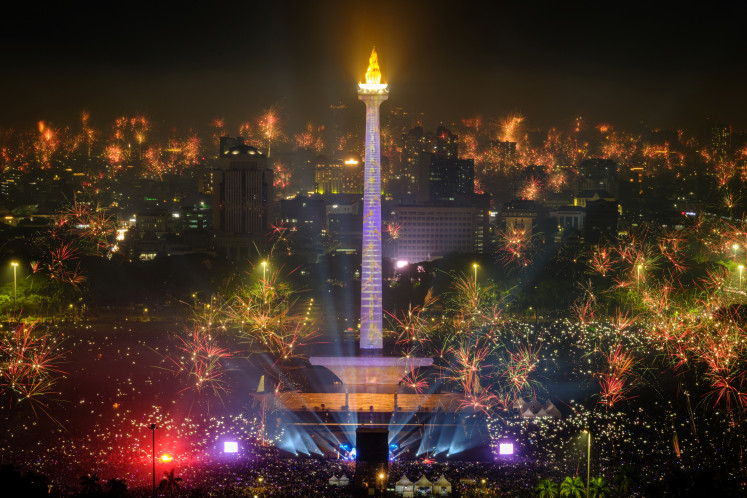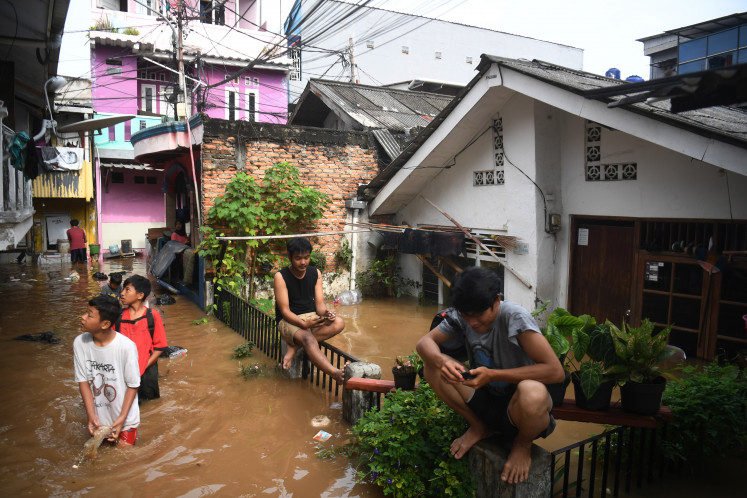Popular Reads
Top Results
Can't find what you're looking for?
View all search resultsPopular Reads
Top Results
Can't find what you're looking for?
View all search results1965 atrocities leave mental scars on victims
Healing the wounds: Coordinating Political, Legal and Security Affairs Minister Luhut Pandjaitan (second right), Justice and Human Rights Minister Yasonna Laoly (left), Home Minister Tjahjo Kumolo (behind Yasonna) and Attorney General M
Change text size
Gift Premium Articles
to Anyone

H
span class="caption">Healing the wounds: Coordinating Political, Legal and Security Affairs Minister Luhut Pandjaitan (second right), Justice and Human Rights Minister Yasonna Laoly (left), Home Minister Tjahjo Kumolo (behind Yasonna) and Attorney General M. Prasetyo (right) attend a national symposium on the events of 1965 in Jakarta on Monday.(JP/Don)
More than 50 years later, the failed coup blamed on the Indonesian Communist Party (PKI) and the ensuing communist purge in 1965 have continued to leave mental scars in the psyche of families and victims of what many deemed as one of the worst atrocities in the 20th century.
Survivors from the tragedy have spoken for the first time in public during a government-sponsored symposium on Monday on how they were haunted by memories of killings that took place during the month of October in 1965.
Speaking in front of an audience during the symposium on Monday, Catherine Panjaitan, the eldest daughter of Brig. Gen. Donald Izacus Panjaitan, one of the seven army generals killed during the failed coup, remembered the vivid details from the night when her father was taken away from her house in South Jakarta by a group of soldiers.
“On the night of Sept. 30, I sneaked into my room after returning home from a school event at the Gelora Bung Karno sports complex, Senayan, and went to bed. At 4 a.m., I woke up as I heard footsteps of people in boots. Then I took a peek from my room upstairs. It turned out that we had been surrounded by members of the military,” Catherine said.
The group of soldiers then waited for Catherine’s father to come downstairs as circumstances started to get very tense.
“They didn’t want to go upstairs. My father was waiting upstairs cocking his rifle, but it was jammed. So he didn’t get a chance to defend himself before he was murdered, and didn’t get the chance to commit a sin before he died,” Catherine said.
Catherine’s father was eventually taken by the group and executed, with his body being disposed of in a well in Lubang Buaya, East Jakarta.
Her life would never be the same after that night.
“After that night, my life was turned upside down. That’s only natural because I was only 17 years old at that time. So I cried, contemplated committing suicide, taking drugs and so on. Eventually my mother and I went to a doctor who recommended me to move out from my house because that house would induce trauma,” said Catherine, adding that she followed up the doctor’s order by moving to the Netherlands to study.
Catherine thought about never setting foot in Indonesia again.
“I didn’t want to go back to Indonesia for a long time. Truthfully, I despised Indonesia because I was still naïve at that time. When I was studying in the Netherlands, I frequently visited psychiatrists, but none of them could give me answers [that I needed]. I was extremely emotional,” Catherine said.
She finally found solace in her faith, Christianity.
“When I returned to Indonesia, I went to a church and I met a pastor who told me that Jesus had died for me. Until now, I can only cry when I remember that I decided not to commit suicide. If I didn’t pray, I don’t know what I would’ve become,” said Catherine.
She said that she also considered herself to be lucky after she met other survivors of the tragedy back in 2012 during a show on a local television station.
“My father was indeed killed, but I didn’t have to go into hiding [like other victims of the tragedy]. I cried saying that I was sorry because I didn’t know that their pain was greater than mine,” Catherine said.
She was referring to the victims of the massacre that according to some estimates reached 500,000 people, with most being members and supporters of the PKI, who were later blamed for the botched coup attempt.
Other individuals who were believed to have links to the PKI were also imprisoned without proper trial, an injustice that has also left deep scars for many victims.
Seventy-five-year old Nani Nurani from Cianjur, West Java, said she suffered from severe depression after she was accused of being a member of the PKI.
“In July, 1965, I was asked to sing during the anniversary of the PKI. I delivered the performance in my capacity as an official at the local cultural agency in Cianjur,” she said. “Then in November 1965, I started working at PT Takhari, which was managed by veterans, attorneys and the military. All these things led authorities to accuse me of being a special agent working for the PKI.”
Following the accusation, Nani’s mental state went on a downward spiral.
“I became depressed and in 1966, I became a patient at a mental hospital. Then in 1968, five people came to arrest me. I spent seven years in Bukit Duri female penitentiary, South Jakarta,” she said.
Nani filed a lawsuit at the Jakarta State Administrative Court (PTUN) against her injustice and won the case in May 2008.
“I won this case, but there has been no effort from the state to clear my name. There is nothing that could bring back my career and livelihood,” she said.
_________________________________________
To receive comprehensive and earlier access to The Jakarta Post print edition, please subscribe to our epaper through iOS' iTunes, Android's Google Play, Blackberry World or Microsoft's Windows Store. Subscription includes free daily editions of The Nation, The Star Malaysia, the Philippine Daily Inquirer and Asia News.
For print subscription, please contact our call center at (+6221) 5360014 or subscription@thejakartapost.com









